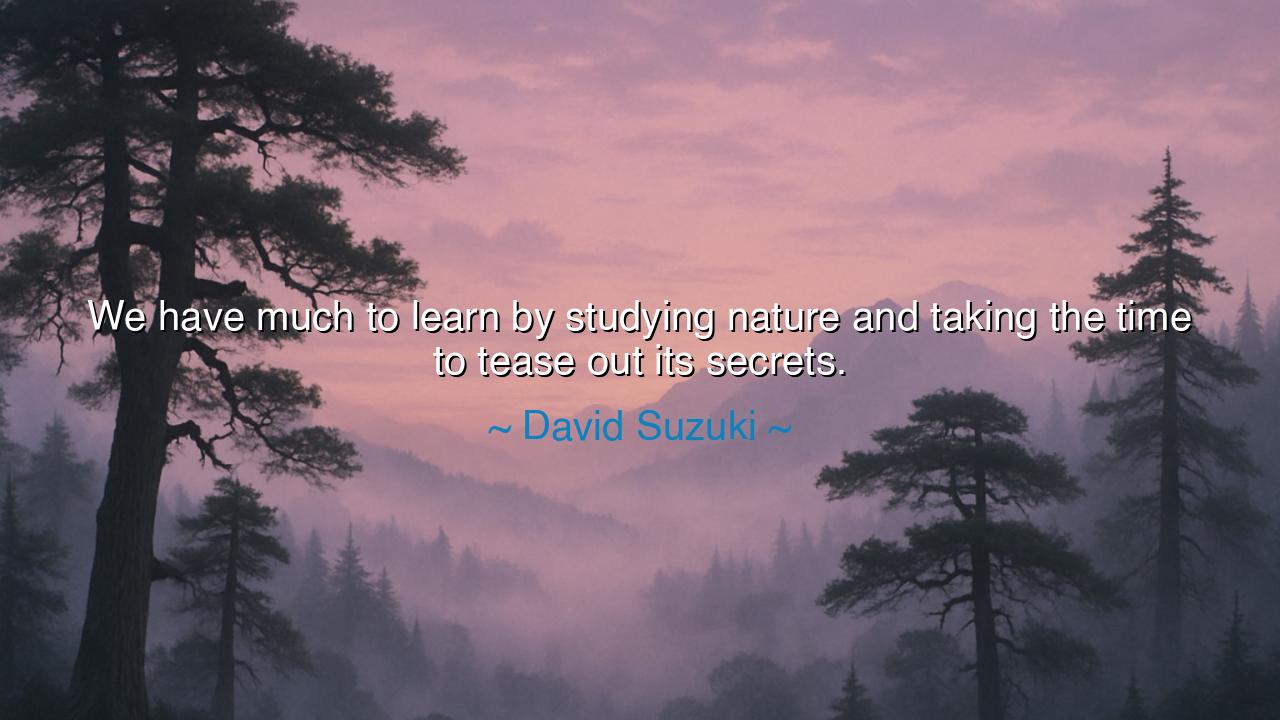
We have much to learn by studying nature and taking the time to






The words of David Suzuki remind us of a truth older than kingdoms and deeper than oceans: “We have much to learn by studying nature and taking the time to tease out its secrets.” In this saying, there is both humility and wonder. For too long mankind has sought to master, to conquer, to exploit the earth. Yet Suzuki reminds us that nature is not a servant to command, but a teacher to revere. Within its forests, rivers, mountains, and skies lies a vast library of wisdom, waiting to be read by those with patience and reverence.
The origin of this insight rests in the timeless relationship between humanity and the living world. From the earliest days, our ancestors learned survival not from invention but from observation. They watched the birds to learn of flight, studied the stars to mark time, and followed the tracks of animals to find food. The ancients who gazed upon the spiral of a seashell or the branching of a tree were, unknowingly, reading the geometry of the universe. Suzuki’s words are thus not only modern but ancestral, echoing the call that knowledge lies first in listening to the earth’s patterns.
History is filled with examples of those who heeded this teaching. Consider the Wright brothers, who studied the wings of birds before designing their flying machine. Without their careful observation of nature’s design, humanity might not have taken to the skies when it did. Or reflect upon the healing plants used by indigenous peoples, wisdom gathered through centuries of patient watching and experimenting, revealing cures long before laboratories existed. These are but glimpses of the treasures hidden in the secrets of nature, awaiting those who take time to seek them.
There is also within this quote the reminder of patience. Suzuki speaks of “teasing out” secrets, for nature does not give them freely or all at once. Its truths are veiled, like a scroll sealed with wax, requiring time, care, and humility to open. This patience stands in stark contrast to the haste of modern life, where men demand quick answers and instant solutions. The secrets of the forest and the ocean, however, yield themselves only to those who linger, who return again and again with eyes to see and hearts to listen.
The ancients would say that to study nature is to study the mind of the Creator. For in the symmetry of a snowflake, in the strength of a spider’s web, in the resilience of a seed that lies dormant for centuries only to sprout anew, we glimpse eternal principles. Harmony, endurance, balance, renewal—these are not human inventions but lessons written into the very fabric of life. The wise man does not try to outwit these laws, but to live in accord with them, just as a sailor sets his sails to the wind rather than cursing it.
From this teaching arises a lesson for all who seek wisdom: be students of the natural world. Take time to observe before you act. Look at how the forest regenerates after fire, and learn resilience. Study how rivers carve valleys over ages, and learn persistence. Watch how ecosystems sustain themselves, and learn balance. Do not imagine that human cleverness alone will secure the future, for it is only by aligning ourselves with the wisdom of the earth that we may endure.
Practically, this means to cultivate habits of attention and reverence. Spend time in the natural world, not only for beauty but for learning. Support those who protect and study the earth, for they are guardians of humanity’s future. And in your daily life, live gently upon the land, remembering that every resource taken is a gift borrowed, not seized. For if we destroy the teacher, we silence the lessons yet to come.
Thus, Suzuki’s words are both a reminder and a warning. The secrets of nature are inexhaustible, but only for those who walk humbly and attentively. The arrogant will pass by them and see nothing; the patient will discover treasures that can change the destiny of generations. Carry this teaching as the ancients carried sacred scrolls, and let it guide your steps: to learn from the earth, to walk in harmony with it, and to leave behind not ruin, but wisdom for those yet unborn.






AAdministratorAdministrator
Welcome, honored guests. Please leave a comment, we will respond soon